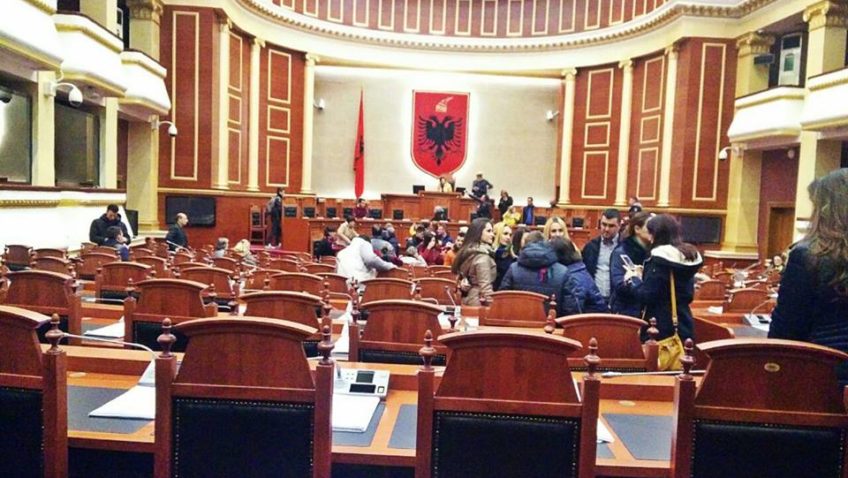This week, the Minister for European and Foreign Affairs, Mr. Ditmir Bushati presented the draft law on “Protection of National Minorities in the Republic of Albania” in the Parliamentary Law Committee. The new law updates the national minorities that Albania officially recognizes from six to eight. According to the law, the national minorities in the Republic of Albania are Greek (24.243), Macedonian (5.512), Wallachian (8.266), Roma/Egyptian (8.301), , Montenegrin (366), with Bosnian, Serbian, and Bulgarian being recognized as community minorities. In the population census conducted in 2011, minorities resulted to 52,700 individuals in Albania, or 1.9% of the population in the country.
Mr. Bushati stated that the law has been approved as a co-proposal of four institutions: the Ministry of Foreign Affairs, the Ministry of Interior, the Ministry of Social Affairs, and the Ministry of Education. The law addresses a wide range of issues, as well as, as well as the international obligations and commitments that Albania has received, mainly after the collapse of the communist regime, and subsequently in the framework of the European integration process in terms of protection and promotion of minority rights.
Albania has become an active part of the United Nations Guide for Minorities, the Council of Europe, and more specifically the Framework Convention for the Protection of National Minorities and fully respects the international standards that are associated with these treaties. Parts of these standards are reflected directly in the Albanian constitutional and legal framework.
The new law on national minorities follows the European Convention on Human Rights; it ensures and promotes the access of persons belonging to national minorities, including the smallest groups, to television and radio programs in their own languages. According to Mr. Bushati this has been emphasized in meetings with different groups and associations belonging to various minorities. There has also been a discussion of whether certain minorities should be given more privileges in relation to other minorities which cannot be accepted neither by domestic or international standards, according to Mr. Bushati.
Furthermore, the Advisory Committee for the law on national minorities has proposed the processing of data and census in full compliance with the principle of self-declaration and ensures that future censuses provide proper procedures and other forms of data collection in order to provide credible data for finding persons belonging to national minorities.
Co-operation between public authorities and representatives of national minorities has been recommended by the committee through intensifying dialogues with persons belonging to minorities, more learning opportunities in their own languages, as well as strengthening minority representation in associations, consultation on minority issues, use of minority languages in relations with administrative authorities, and finally use of traditional names and other topographic signs.
What is more, the new law also sees for the establishment of a new Commissioner for Protection from Discrimination whose responsibilities will be to examine complaints alleging discrimination by persons, groups of persons, or of organizations, to perform administrative inquiries on their own initiative after receiving reliable information, to impose administrative sanctions as defined by law, to encourage the principle of equality and non-discrimination among others for this law in Albanian and minority languages, to monitor the implementation of this law, to conduct surveys related to discrimination, to make legislative recommendations to competent authorities and recommendations for any kind of discrimination-related issue, to represent the complainant in judicial bodies in civil matters, and to develop awareness-raising and education activities that help to implement of this law.
Yet, as the new law is about to go into effect, the first signs as to how members of minorities will try to interpret it are not very encouraging. Only a few days after the presentation of the law to the Parliamentary Law Committee, representatives from the Greek minority as well as the Ministry of Foreign Affairs of Greece, and Greek media have joined forces in criticizing the Albanian Government for the urban rehabilitation in Himara, Vuno, and Dhërmi, and there have been complaints by residents of Himara that say such policies conceal selective and clientelistic policies. According to Mr. Vangjel Dule, president of the PBDNJ(Unity for Human Rights Party) and representative of the Greek minority, there have been always problems with the identity of the people in the municipality of Himara. He also added that the plan is aimed at expropriating citizens who identify themselves as Greeks in order to relocate them. The Minister of Culture Ms. Mirela Kumbaro opposed the statements of Vangjel Dule and said the plan only targets the development of the area and is being used politically by individuals in order to create confusing opinions and divide the citizens.
The law also triggered the reaction of the Bulgarian Embassy in Tirana, which expressed concern about the lack of representation of the Bulgarian minority in the group of eight minorities envisioned by the new law.
Finally, representatives from the civil society have proposed that the law on national minorities shall consider a legal space that would precede cases of self-declaration. The proposal was made at the joint meeting of the parliamentary law committee and the supervising external committee. The law can be complemented with a predicting feature, or with a formula that leaves space for self-declaration for anyone in the future, something that in the census of 2011 was inexistent for all minorities in Albania. The complexity of the law is becoming evident before being adopted with some minorities trying to get more privileged status, whereas other minorities are trying to incorporate themselves in the law.


0 comments